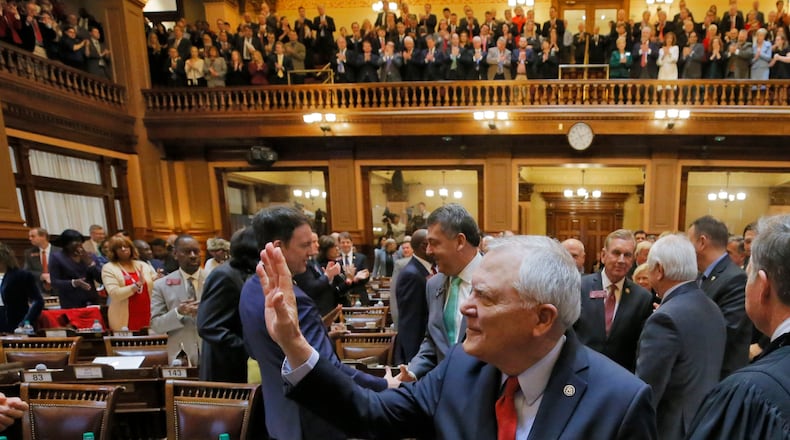With Georgia’s economy continuing to grow, Gov. Nathan Deal increased his projection of how much tax money the state will take in next year, allowing lawmakers to fully fund the k-12 school funding formula after more than a decade of cutbacks.
State House Appropriations Chairman Terry England, R-Auburn, made the announcement Tuesday as House and Senate negotiators agreed to a $26.2 billion budget for fiscal 2019, which begins July 1.
The agreement, which the Senate approved 54-1 Tuesday and the House was expected to pass, clears the way for the legislative session to end Thursday. By law, the only bill lawmakers must pass each session is a budget for the upcoming fiscal year.
So-called “austerity cuts” in the Quality Basic Education formula for k-12 school funding have been a political thorn in Deal’s side since he took office in 2011. In the aftermath of the Great Recession, they topped $1 billion — money that was supposed to go to schools but didn’t because of cutbacks at the statehouse.
Deal whittled it down for several years to about $166.7 million. When he sent lawmakers a letter stating the revenue estimate for the upcoming year would rise this week, the first thing he recommended the money go to was wiping out the rest of that deficit.
That means k-12 schools will get $166.7 million more than expected in the upcoming year.
“We are excited about that and tickled,” England said. “That has been something on the minds of our (House) members for a many years.”
State House Speaker Pro Tem Jan Jones, R-Milton, said, "To fully fund QBE … what a legacy."
Senate Appropriations Chairman Jack Hill, R-Reidsville, said the extra money for some small systems in his South Georgia district will be the equivalent of gaining a mill — $1 per $1,000 in assessed value — worth of property taxes.
Claire Suggs, a senior education policy analyst at the Georgia Budget and Policy Institute, said it will be the first time the basic school formula has been fully funded since 2002.
“I think it’s a really positive step toward getting Georgia students the resources they need to be successful in school,” Suggs said. “The impact of underfunding schools was profound.”
She said that at the height of the cutbacks, the number of school days was cut, class sizes exploded, teachers were furloughed and programs were eliminated.
“The austerity cuts had a really negative impact on districts,” she said.
The Professional Association of Georgia Educators, the state’s largest teacher group, praised Deal.
“Ongoing education funding cuts began before Deal’s tenure as governor and have impacted millions of Georgia students since they began 16 years ago,” said Craig Harper, the executive director of PAGE. “Finally achieving full funding of Georgia’s education formula is an important and welcome achievement for Governor Deal and his legacy.”
The new budget deal also includes $100 million in borrowing for unspecified transit projects and $16 million in grants to k-12 systems to improve school safety in the aftermath of last month’s Florida campus massacre.
Most of the more than $1 billion in new spending next year will go to schools, colleges and public health care programs. About $361 million will go to prop up the teacher retirement pension system.
“We’re very judiciously growing our state and meeting the needs of our citizens the best we can,” Hill said.
Budget negotiators went with the House position by urging the Employees Retirement System to consider a benefit increase for state government pensioners. The House had requested a bonus of up to $900; the Senate had opposed the idea. State government pensioners haven’t had a cost-of-living increase for about a decade.
Lawmakers also put more than $1 million into the budget to pay for pension increases for state lawmakers. The House has already passed House Bill 624, which would double some legislator pensions, and it is awaiting a vote in the Senate, which could come Thursday.
Budget negotiators removed $3 million that the Senate had put into the budget to provide grants to local police agencies to increase pay. Local police and sheriff's officials have complained for more than a year that the state's decision to boost the pay of state troopers has made it harder for them to keep officers. However, the state pays the salaries of state troopers, while local governments — city councils and county commissioners — fund local law enforcement.
The spending plan will include more than $1 billion in borrowing for construction. Deal added a few projects at the last minute, including $4.5 million for a new conference center at Lake Lanier Island and $7.5 million for a pedestrian mall at the World Congress Center.
State Senate Majority Leader Bill Cowsert, R-Athens, said,"There are lots of things for rural Georgia, lots of things for health care, lots of things for children."
About the Author
Keep Reading
The Latest
Featured




